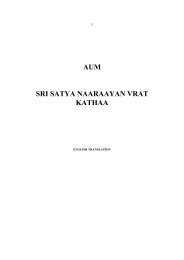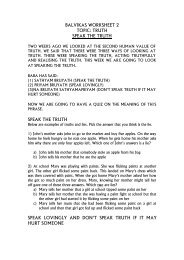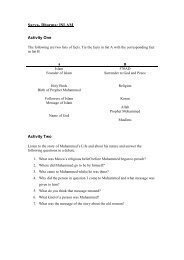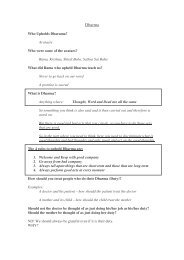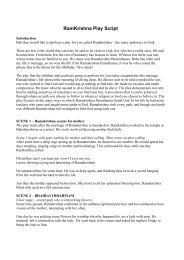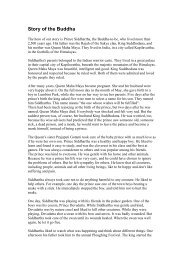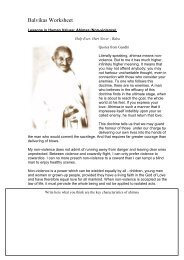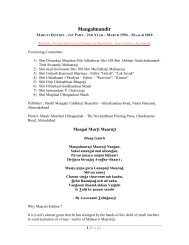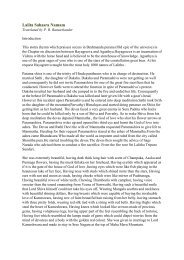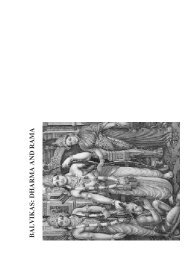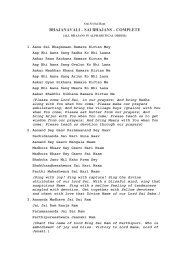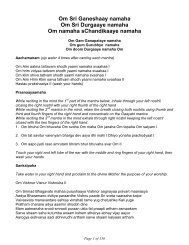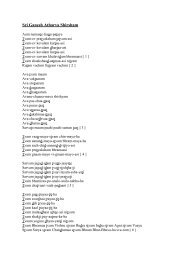Buddhist <strong>Prayers</strong>Buddham Saranam GacchamiSangham Saranam GacchamiDharmam Saranam GacchamiBuddham-Sangham-Dharmam"Make an effort to see the same divine principle everywhere and in everything, until you realize the ultimatetruth, that only the Atma exists, that only the Self is real."Buddha taught the same great truth, although he may not have made reference to Veda or used Vedantic terms,nevertheless, he experienced and demonstrated the essential spirit of Veda. First he said, 'Buddham, SharanamGacchami', meaning, 'I take refuge in the Buddhi, my power of discrimination.' This deals with the individual; itspeaks of the limited personality. Gradually, he added, 'Sangham Sharanam Gacchami', meaning, 'I take refugein the community, I take refuge in the society.' He recognized that feelings associated with individual andpersonal considerations are selfish and narrow, and cannot take you very far.You should not consider this individual self as everything; it is only a drop in the ocean. Along these lines,Krishna also commanded, "Arjuna, expand your heart. Become broadminded. Include the entire society withinyour scope." Society does not have any particular form; it is made up of individuals. When a large number ofindividuals join together they become a society. Swami often say, 'Expansion is My life'. When you expandindividual life to infinity it becomes divinity; that is to say, let individual life multiply and broaden and it willeventually reach divinity. Therefore, Krishna told Arjuna, "Live in the society; serve the society; and developbroadmindedness."The meaning of society in one country may be different from that in another; and a society or community calledby one name may have nothing to do with a society or community called by another name. So, you will findthat there are limits even for a society, and that the society by itself will not take you all the way to infinity.Therefore, Buddha added one more step, 'Dharmam Sharanam Gacchami', meaning, 'I take refuge in Dharma, Itake shelter in truth and righteousness'. Dharma, as used here, has a very broad connotation; it refers to the onewho supports the entire world. When you investigate the general meaning of the word Dharma, you find that itrelates to the basic nature of a thing; its essential truth. The 'thing' referred to here is the immortal Atma, theindwelling divinity. Therefore, the deeper meaning of Dharma is found in the true nature of divinity. To takerefuge in Dharma is to become one with the attributes of divinity. It has been said that Maya is the body of God,but it is more correct to say that Dharma is the body of God. It is His very form. That is why Krishnaannouonced, 'For establishing Dharma I have come again and again.' Dharma reveals the broad nature ofdivinity in all its glorious aspects.In a life filled with desires, the pleasures one seeks are inevitably followed by grief and disappointments. Allunrighteous actions lead to sorrow. It was for this reason that Buddha emphasized the need for discrimination.The first prayer, "Buddham Saranam Gachami" is a call for cultivating wisdom and discriminations - theBuddhi. But unless the power of discrimination is used for doing right action for the good of society it is of nouse. Hence the second prayer, "Sangham Saranam Gacchami" (I surrender myself to society). What is this rightaction that must be done? That is indicated by the third prayer: "Dharmam Saranam Gacchami" (I take refuge inDharma). To reach your goal, the royal road is Dharma - Righteousness. It is only when these are combined -Wisdom, Social Service and Righteousness - that there is fulfilment in life.BHAGAVAD GITA DISCOURSESby BabaImage and text from : http://www.saibaba.ws/teachings/buddha/buddha.htm
Muslim <strong>Prayers</strong> (Image and text from: http://saitowers.com/spi/magazine/julaug2001/prayerformuslim.htm)Bismillaa hir Rahmaanir Rahim1. Al Hamdu lillaahi Rabbil Aalameen2. Ar Rahamaanir Rahim3. Maaliki Yav middeen4. Iyyaaka nabudu Va Iyyaaka nasta een5. Ihdinas siraatal mustakeem6. Siraatalla zeena an amta alai him7. Gairil magzubi alaihim va lazzaalleenMeaning: In the name of Allah, the most beneficent andmerciful1. All praise be to Allah, the most just ruler of theworlds2. The most beneficent and merciful3. The Lord of the day of judgement4. You alone we worship; you alone we ask for help.5. Show us the straight path6. The path of those whom you have favoured7. Not (the path) of those who earn your anger or ofthose who go astrayNotes:Before the time of Prophet Mohammad, Arabs used the phrase ‘Bismillah’ only, which meant ‘In the name ofAllah’. At that time people believed that Allah was supposed not to be very responsive to personal problemsand prayers. But the prophet described God as the most beneficent and merciful (Rahmaanir Rahim), quitesensitive to our problems and responsive to our prayers. Such a perception of God was more conducive todevelop an intimacy and relationship with God and Islam grew into a great religion closely knitting largesections of humanity.1. In the first sentence of this prayer, the devotee recognises the presence of the hand of God behind all that issuccessful and praiseworthy. God’s grace is the main switch and man’s effort is the room switch. Without themain switch on, putting on the room switch is of no avail. It is interesting to note a similar conviction in theBhagawad Gita (18:78) and in the Bible (Book of Job etc).2. The idea of the day of judgement is common to Hinduism (Refer Chitragupta’s records of all our actions and thejudgement by Yama) as well as to Christianity (corroborated by modern discoveries in parapsychology).3. The sole dependence on God by the devotee is again a common feature in the principal religions.4. The straight path is also known as the narrow path in Christianity and as the razor’s edge in Hinduism. It isdifficult to walk along it but the reward is worth all the effort. As the Gita says it is like poison in the beginningand like nectar in the end.5. The last part of this prayer is an echo of the last part of Lord’s prayer in the Bible, which says ‘Lead us not intotemptation but deliver us from evil.’



